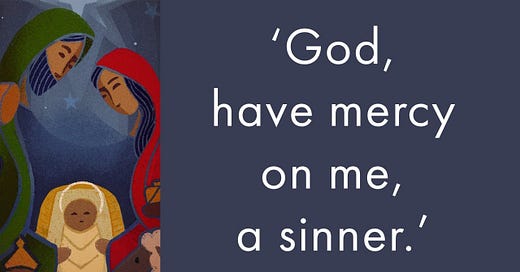The understanding of sin is often misinterpreted and oversimplified in various religious contexts. Many traditions reduce it to a mere condemnation of wrongdoing, overlooking its true depth and nuance. This exploration examines the rich meaning of what it means to be a "sinner," drawing from ancient wisdom literature and the etymology of key terms like "hamartia." By examining these ideas alongside parallel concepts from other traditions, such as the Islamic notion of "ghaflah," we uncover a universal human condition that transcends specific religious boundaries. This perspective illuminates our shared spiritual journey of remembrance and awakening, offering a fresh lens through which to view our relationship with the divine and our true nature.
The phrase "You are a sinner" goes far beyond simply labeling someone as a wrongdoer. Instead, it speaks to a fundamental state of being that affects our entire perception of reality and our relationship with the divine.
Here's a more nuanced exploration:
A state of perceived separation: To be a "sinner" is to live in a state of perceived disconnection from God. It's not that we are actually separate from the divine, but rather that we believe ourselves to be. This misperception colors our entire worldview and how we interact with reality.
Missing the mark: The term "sin" in its original context means "to miss the mark," like an archer missing their target. This meaning is rooted in the Greek word "hamartia," which originally referred to missing the mark in archery but came to mean "error" or "sin" in a moral or spiritual context. This etymology suggests that being a sinner is about failing to align with our true nature and purpose, rather than being inherently flawed or evil.
Forgetting our inherent goodness: When God created the world, including humans, He declared it "good." Being a sinner means we've forgotten or lost touch with this fundamental goodness that is our birthright. We've mistakenly come to see ourselves as separate from or opposed to the divine.
The fruit of dualistic thinking: Eating from the tree of knowledge of good and evil symbolizes humanity's shift into dualistic thinking. As "sinners," we view the world through a lens of good versus evil, right versus wrong, us versus them. This dualistic perspective prevents us from seeing the underlying unity and interconnectedness of all things.
False equivalence with divine knowledge: In our "sinful" state, we often make the mistake of equating our limited understanding with God's infinite wisdom. We presume to know good and evil as God does, forgetting the vast difference between human and divine perception.
A call to awakening: Understanding "You are a sinner" in this light transforms it from a condemnation to an invitation. It's a call to awaken from the illusion of separation, to remember our true nature, and to realign ourselves with the divine reality that underlies all existence.
The path to redemption: In this context, redemption isn't about being saved from an inherently evil nature, but about remembering and reconnecting with our true, divine nature. It's a process of awakening to the reality of our oneness with God and all creation.
This deeper understanding of "You are a sinner" shifts the focus from guilt and unworthiness to awareness and transformation. It invites us to see beyond the dualistic thinking that separates us from God and each other, and to rediscover the inherent goodness and unity that is our true state of being.
As we explore the deeper implications of the phrase "You are a sinner," it becomes clear that this concept transcends mere moral failing; it speaks to a profound state of being characterized by a perceived disconnection from the divine and a forgetfulness of our true nature. This state of forgetfulness is echoed in the Islamic term "ghaflah," as articulated by Huston Smith, which encapsulates the human tendency to become heedless of our spiritual essence and inherent goodness. Just as being a "sinner" reflects our failure to recognize our alignment with the divine purpose, ghaflah highlights our negligence in remembering our connection to God. Both concepts illuminate the universal human challenge of navigating a world filled with distractions and dualistic thinking, ultimately inviting us to awaken from this spiritual amnesia and rediscover our true identity as beings of inherent worth and goodness.
Huston Smith, the renowned scholar of world religions, indeed uses the Islamic concept of "ghaflah" (often transliterated as "gaflah" or "ghaflah") to explain the human condition of spiritual forgetfulness. Here's an explanation of how Smith explains this term:
Ghaflah (غفلة) is an Arabic word that means "heedlessness," "forgetfulness," or "carelessness". In Islamic theology, it refers to a state of spiritual forgetfulness or negligence, particularly in relation to God and one's divine origins. Smith employs this concept to describe the human tendency to forget our true nature and spiritual essence. He suggests that we often live in a state of ghaflah, where we:
Lose sight of our connection to the divine
Become overly absorbed in worldly concerns
Forget our higher purpose and spiritual potential
This state of forgetfulness is seen as a fundamental human challenge in many spiritual traditions, not just Islam. Smith uses the term to illustrate how humans often live in a state of disconnection from their deeper spiritual reality.
The remedy for ghaflah, according to Islamic thought, is dhikr or remembrance of God. This aligns with Smith's broader view that spiritual practices across religions aim to awaken us from our forgetfulness and reconnect us with our true nature and the divine.
By using this Islamic term, Smith draws parallels between different religious traditions, showing how they often address similar spiritual challenges using different language and concepts.
Summary: In essence, the concept of being a "sinner" or experiencing "ghaflah" reflects a universal human condition that transcends specific religious boundaries. It speaks to our shared struggle with spiritual amnesia, where we forget our true nature and connection to the divine. This forgetfulness manifests as a perceived separation from God, a misalignment with our purpose, and a tendency to view the world through a dualistic lens. Importantly, it is in this state of forgetfulness that we become more susceptible to wrongdoing and harmful behaviors. When we lose sight of our inherent goodness and divine connection, we are more likely to act in ways that are out of alignment with our true nature, causing harm to ourselves and others.
However, recognizing this state is not a condemnation but an invitation to awaken. It calls us to remember our inherent goodness, to see beyond the illusions of separation, and to realign ourselves with the divine reality that permeates all existence. Through this deeper understanding, we can transform our spiritual journey from one of guilt and unworthiness to one of awareness, remembrance, and ultimate reunion with our true, divine nature. This perspective offers a profound and hopeful approach to human spirituality, emphasizing our capacity for awakening and the inherent unity of all beings, while acknowledging the real consequences of our spiritual forgetfulness.





